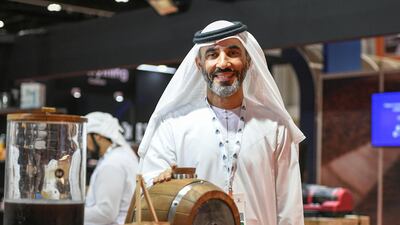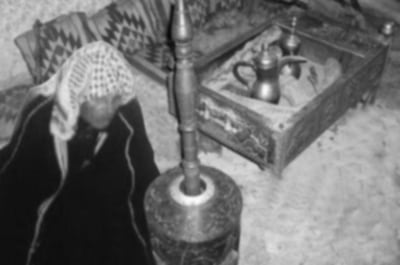Caffeine addicts often say coffee is a way of life, but for Sari Al Zubaidi it is also a legacy.
The Jordanian, of Palestinian origin, has coffee-making in his blood, with the practice having been passed down by the men in his family for three generations.
In 1949, in a desert village somewhere between Palestine and Jordan, his grandfather would wake the neighbours with the sound of pestle scraping against mortar as he gently ground some coffee beans.
The smell of the brew wafting along on the morning air was an open invitation to anyone nearby to stop in for an early cup of coffee.
This process was passed down to his father, whom Mr Al Zubaidi, 42, never saw without a cup in hand.
His father would wake early to make coffee and fill their Abu Dhabi home with the aroma.
Seven decades on from his grandfather's daily routine, Mr Al Zubaidi is carrying on the family legacy, but in a more modern way – by opening his own cafe.
“The process of creating green coffee was there at my grandfather’s tent. Nowadays, no regular cafe can do this process fully without hiring a specialist for each stage of the process,” said Mr Al Zubaidi, a barista and entrepreneur.
“My father inherited coffee-making from his father and continued to make his own coffee at home after he moved to Abu Dhabi in 1976. I was about two years old.
"For as long as I can remember, I used to wake up to the scent of his coffee in the morning."
However, he was not always a fan of coffee. For a long time, Mr Al Zubaidi defied family tradition by having no taste for the stuff.
"For me, it didn't matter if it was there or not. When I went out with my friends for coffee, they would get frustrated because I never knew what to order," he said.
“All the different types seemed alien to me. I did not know the difference between a cappuccino and latte and macchiato. I often ended up ordering orange juice.”
This changed five years ago, when Mr Al Zubaidi read an article about speciality coffee.
“I saw that coffee is an art. I was impressed by the sophistication of speciality coffee production and how they observe the process starting from the picking of the coffee cherry by the farmer.”
He was also impressed that major coffee producers supported farmers and their families.

"Coffee farming is a tough job; beans can only be grown 1,000 metres above sea level, and you always find the best coffee beans in the poorest countries," he said.
“So they try to support the farmers by sending their children to school – to raise their education and awareness.”
He began to experiment at home, making blends of coffee and inviting friends and neighbours over to try his inventions.
He also travelled to Bali, where he was driven up through the mountains to visit coffee farms and learnt about the process first hand. And in 2017, he became certified by the Specialty Coffee Association.
"I come from a business background and when I got deep into the coffee industry I discovered that, like petrol, it is worth billions. It is also a science: 20 per cent of the taste comes from the tongue and 80 per cent from the nose."
Mr Al Zubaidi chose to specialise in drip coffee.
“I learnt about Arabic coffee from my grandfather and Turkish coffee from my father so I specialised in something new.”
Two years ago, he began the process of setting up his own speciality coffee house and bakery – due to open next month.
The twin-villa complex he rented for what will become Cafe di Rosati was designed down to the smallest detail by Mr Al Zubaidi to ensure it reflects his family’s heritage.
The pillars are made of special stone shipped from Palestine, known as Shyookh Al Khaleel (sheikhs of Hebron).
“An olive tree will be planted here soon,” he said, pointing an area in the front garden.
The massive machines that will recreate his grandfather’s signature “green coffee” will have their own special room.
"There is a growing interest in the understanding of speciality coffee," he said, explaining that good coffee does not cause health issues, but that leftovers from the grind in commercial coffee is what doctors warn against.
“My father taught me ‘there is no bad coffee, there are only good moods for coffee’.”



